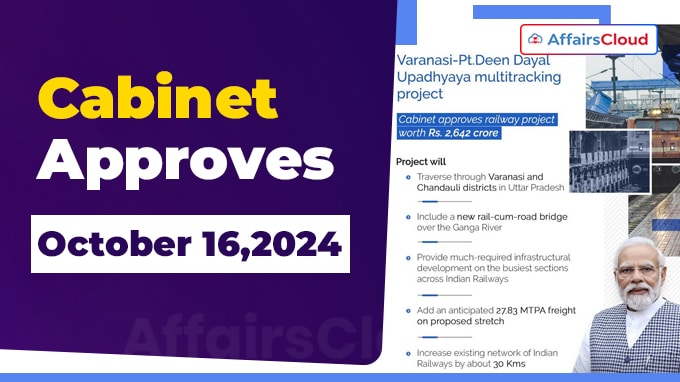 The Union Cabinet chaired by Prime Minister (PM) Narendra Modi has approved various schemes and projects on 16th October 2024.
The Union Cabinet chaired by Prime Minister (PM) Narendra Modi has approved various schemes and projects on 16th October 2024.
i.The Cabinet has approved,
- The additional instalment of 3% of Dearness Allowance(DA) to Central Government employees and Dearness Relief(DR) to Pensioners.
- The Varanasi-Pt.Deen Dayal Upadhyaya multi-tracking project of the Ministry of Railways with an estimated cost of Rs 2642 crore.
- Rs. 35,000 crores allotted for the continuation of Pradhan Mantri Annadata Aay SanraksHan Abhiyan (PM-AASHA) schemes to support farmers and control price volatility.
ii.The Cabinet Committee on Economic Affairs (CCEA) has approved the increase in the Minimum Support Prices (MSP) for all mandated Rabi Crops for Marketing Season 2025-26.
Additional instalment of 3% of DA Government employees & DR to Pensioners
The Union Cabinet has approved a 3% increase in Dearness Allowance (DA) to Central Government employees and Dearness Relief (DR) to pensioners, with effect from 1st July 2024.
- This additional instalment represents an increase of 3% over the existing rate of 50% of the Basic Pay/Pension. This aims to compensate for the price rise.
- This brings the dearness relief to 53%.
i.This will benefit about 49.18 lakh central government employees and 64.89 lakh pensioners.
- This increase is in accordance with the accepted formula, which is based on the recommendations of the 7th Central Pay Commission.
iii.The combined impact on the finances of the government on account of both DA and DR would be Rs.9,448.35 crore per annum.
Note:
i.This is the second time the two components have been revised this year, the first time was on 1st January 2024.
ii.The increment is based on increase in 12-monthly average of All India Consumer Price Rise Index for Industrial Workers published by the Labour Bureau.
Varanasi-Pt.Deen Dayal Upadhyaya multi-tracking Project:
The Union Cabinet has approved a Varanasi-Pt. Deen Dayal Upadhyaya multi-tracking project of the Ministry of Railways with a total estimated cost of Rs. 2,642 crores.
- The project traverses through Varanasi and Chandauli districts in Uttar Pradesh(UP).
Details of the project:
i.The multi-tracking projects include the development of a new rail-cum-road bridge over the Ganga River and the addition of 3rd and 4th railway lines.
ii.The new bridge will replace the 137-year-old Malviya Bridge, which currently has two rail lines and two road lanes.
- The new bridge with four railway lines and a six-lane highway is constructed to last for 150 years and spanning over one kilometer, will connect the districts of Varanasi and Chandauli increasing the existing network of Indian Railways by about 30 Kms.
iii.The project is a result of the PM-Gati Shakti National Master Plan for multi-modal connectivity which has been possible through integrated planning.
Benefits:
i.These enhancements aim to improve capacity, efficiency and support the region’s socio-economic growth.
ii.The project will increase the existing network of Indian Railways by about 30 Kilometers (Km).
Additional info:
The Railways will help in achieving climate goals and minimising the logistics cost of India and lower Carbon dioxide (CO2) emissions (149 Crore Kg) which is equivalent to the plantation of 6 Crore trees.
Cabinet approves Rs. 35,000 crore for Continuation of PM-AASHA Schemes
The Union Cabinet has approved the continuation of the Pradhan Mantri Annadata Aay SanraksHan Abhiyan (PM-AASHA) to provide fair prices for farmers and monitor price fluctuations in essential commodities for consumers.
- The total financial outgo will be Rs. 35,000 crore during the 15th Finance Commission Cycle up to 2025-26.
Key changes in PM-AASHA
The government has integrated the Price Support Scheme (PSS) and Price Stabilisation Fund (PSF) schemes under PM-AASHA.
- This integration will provide farmers with remunerative prices for their crops, while stabilizing the market prices of essential commodities to make them affordable for consumers.
The revamped PM-AASHA now includes components like:
- Price Support Scheme (PSS)
- Price Stabilization Fund (PSF)
- Price Deficit Payment Scheme (PDPS)
- Market Intervention Scheme (MIS)
About PM AASHA:
PM-AASHA, launched by the Government of India in 2018 is an umbrella scheme which aims to provide MSP assurance to farmers.
Nodal ministry – Ministry of Agriculture and Farmers Welfare(MoA&FW).
Objective:
i.To improve farmer’s income by strengthening procurement mechanisms in coordination with the State Governments.
ii.To ensure farmers receive remunerative prices for their oilseeds, pulses, and copra.
Components: Price Support Scheme (PSS); Price Deficiency Payment Scheme (PDPS); and Pilot of Private Procurement & Stockist Scheme (PPPS).
Minimum Support Prices for Rabi Crops for Marketing Season 2025-26
The Cabinet Committee on Economic Affairs (CCEA) has approved the increase in the Minimum Support Prices (MSP) for all mandated Rabi Crops for Marketing Season 2025-26.
- The absolute highest increase in MSP has been announced for Rapeseed & Mustard at Rs.300 per quintal followed by Lentil (Masur) at Rs.275 per quintal.
- For gram, wheat, safflower and barley, there is an increase of Rs.210 per quintal, Rs.150 per quintal, Rs.140 per quintal and Rs.130 per quintal respectively.
MSP for all Rabi crops for Marketing Season 2025-26
| S. No. | Crops | MSP RMS 2025-26 (Rs. per quintal) | Increase in MSP (Absolute) (Rs. per quintal) |
|---|---|---|---|
| 1 | Wheat | 2425 | 150 |
| 2 | Barley | 1980 | 130 |
| 3 | Gram | 5650 | 210 |
| 4 | Lentil (Masur) | 6700 | 275 |
| 5 | Rapeseed & Mustard | 5950 | 300 |
| 6 | Safflower | 5940 | 140 |
Note:
i.The increase in MSP for mandated Rabi Crops for Marketing Season 2025-26 is according to the mandate of fixing the MSP at a level of at least 1.5 times of the All-India weighted average Cost of Production.
ii.The expected margin over the All-India weighted average cost of production is 105 % for wheat, followed by 98% for rapeseed & mustard; 89% for lentil; 60% for gram; 60% for barley; and 50% for safflower.
Reforms in procurement policies
i.The government will procure pulses, oilseeds, and copra at Minimum Support Price (MSP) under the Price Support Scheme from 2024-25 season.
- It will cover 25% of national production through which states can buy more of these crops ensuring fair prices to farmers and preventing distress sales.
- However, a 100% procurement policy will apply to Tur, Urad, and Masur for the 2024-25 season.
ii.The government has increased its financial guarantee to Rs 45,000 crore.
- This will enable the Department of Agriculture and Farmers Welfare (DA&FW), under the Ministry of Agriculture and Farmers’ Welfare(MoA&FW), to buy more pulses, oilseeds, and copra from registered farmers on platforms like the eSamridhi portal of National Agricultural Cooperative Marketing Federation of India (NAFED) and eSamyukti portal of National Cooperative Consumers’ Federation of India (NCCF) when market prices fall below MSP.
- It will increase domestic production and reduce dependence on imports.
Price Stabilisation Fund (PSF)
i.The PSF will continue to protect consumers from sharp price spikes in agricultural and horticultural commodities by maintaining a strategic buffer stock of pulses and onions.
ii.The Department of Consumer Affairs (DoCA) will procure these items when market prices exceed the MSP, including from pre-registered farmers decreasing the chances of hoarding, and speculative trading.
iii.Interventions under PSF have also extended to crops like tomatoes, and the scheme supports the subsidized retail sale of products like Bharat Dal, Bharat Atta, and Bharat Rice.
Price Deficit Payment Scheme (PDPS)
i.The government has raised the coverage from 25% to 40% of state production to encourage them to adopt the Price Deficit Payment Scheme for oilseeds.
- Additionally, the implementation period has been extended from three to four months.
ii.The Central Government will provide a coverage up to 15% of the difference between the MSP and the sale or modal price.
Market Intervention Scheme (MIS)
i.Under the changes done in MIS, the government has raised the coverage from 20% to 25% of production and introduced an option for direct differential payments to farmers, replacing the physical procurement process.
ii.In the case of tomato, onion, and potato (TOP) crops, the government will provide the costs of transportation and storage to reduce the price gap between producing and consuming states during peak harvesting times.
- This will provide farmers with fair prices for their produce while stabilising prices for consumers.




